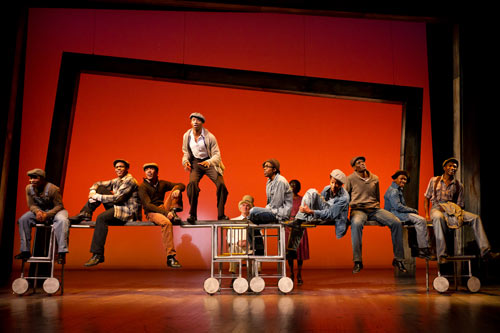“The Scottsboro Boys” Is a Theatrical Triumph
On a spring day in 1931, the lives of nine, young African American teenagers were destroyed. All were pulled from a train destined to Memphis, which each had been riding in search of a new job and a new life. By day’s end, all nine would be jailed in Scottsboro, falsely accused of raping two white girls. Over the next twenty years, there would be multiple trials, retrials, denied pardon applications, and death.
John Kander and Fred Ebb were never known to shy away from difficult subject matter. Cabaret’s Nazi Germany. Chicago’s glitzy murderesses. They often found humor and beauty in dark material. But the trials of the Scottsboro Boys—as they would later become known—was historical fact, not historical fiction. And while joining the illustrious ranks of Stephen Sondheim (Assassins) and Jason Robert Brown (Parade), who also wrote musicals based on America’s sordid past, where could humor or beauty be found in the tragic lives of these young men? Working with librettist David Thompson and director/choreographer Susan Stroman, humor, beauty, and acute sadness is exactly what they found.
In its first production since the Broadway closing, Philadelphia Theater Company’s The Scottsboro Boys—with Stroman’s original direction and choreography (recreated by Jeff Whiting) as well as original sets, costumes, and several Broadway cast members—is a triumph. With powerful performances, spectacular vocals, a cast with unbounded focus and energy, you can’t help but leap to your feet at curtain call.
The performances of Forrest McClendon as Mr. Tambo, JC Montgomery (Mr. Bones), Ron Holgate (The Interlocutor), and Rodney Hicks (Haywood Patterson) are perfection. McClendon—who received a 2011 Tony Nomination for the same part—effortlessly transitions between characters and dialects. (His delivery of the song “That Not the Way We Do Things” is a true highlight of the evening.) Montgomery’s warm baritone makes the lyrical bite of “Financial Advice” that much more acidic. Holgate adds ominous depth to his master of ceremonies—which at first glance seems to be a simplistic, underwritten part. Patterson anchors the cast with his tremendous range: the commanding “Nothin’” and the beautiful “Go Back Home.”
Also of note are Gilbert L. Bailey’s (Ozie Powell/Ruby Bates) performance of “Never Too Late,” the tap number, “Electric Chair,” by 11-year-old Nile Bullock (Eugene Williams), and the extraordinary dance performance by Kendrick Jones (Willie Robeson), as well as Beowulf Boritt’s dexterous set (who knew 13 chairs could be so versatile and effective?) and the extraordinary lighting design by Ken Billington
Some may, at first, feel slightly uncomfortable by Scottsboro Boys’ minstrel show construction, replete with over-exaggerated costumes, over-exaggerated stereotypes and dialects, The Interlocutor character, and actors playing several parts. The genius of the conceit is to highlight that these innocent, young men were never given a fair chance; instead, over and over they were made to perform on a courtroom stage for a white jury audience as instructed by the Interlocutor judge. However, watch as the characters begin to rebel against the minstrel show, rebel against the need to perform and to do as instructed, and simply become young men again.
From its high-adrenaline opening to its quiet and truly devastating finale, The Scottsboro Boys is a show that must be seen. Showcasing the last Kander and Ebb score (Fred Ebb died in 2004), it is a musical filled with remarkable sadness, beauty, and—yes—humor that will stay with you after you leave the theater and make you remember those who should not be forgotten.
The Scottsboro Boys runs through February 19th.



